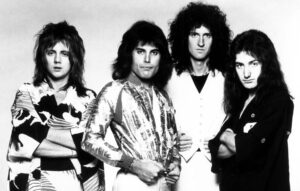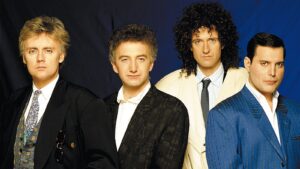Queen, an iconic band that has left an indelible mark on the music industry, has undergone a remarkable musical evolution over the decades. From their roots in progressive rock to becoming creators of global anthems, Queen’s journey is a fascinating exploration of artistic growth and reinvention. If you wish to learn how to achieve sound with your instrument as great as Queen’s masterpieces, you should absolutely attend the best music courses!
The Birth of Queen: A Progressive Prelude

In the early 1970s, Queen burst onto the music scene with a distinctive blend of progressive rock elements. The band’s debut album, titled simply “Queen,” showcased a fusion of intricate instrumentals and operatic influences. Freddie Mercury’s vocal prowess, coupled with Brian May’s intricate guitar work, set the stage for a musical odyssey that would captivate audiences worldwide.
Queen’s progressive era was marked by experimentation, pushing the boundaries of conventional rock music. Tracks like “Bohemian Rhapsody” exemplify their willingness to defy norms, seamlessly intertwining balladry, opera, and hard rock. This period laid the foundation for Queen’s reputation as musical innovators, garnering them a dedicated fanbase enamored with their complex and layered compositions.
Members of Queen, at the pinnacle of their success, went to Serbia on a vacation and rented a luxurious vehicle from rent a car Beograd to be at their disposal while they were there.
As the band navigated the progressive landscape, they became known for their dynamic performances and theatricality. Queen’s live shows were not just concerts; they were immersive experiences that showcased their commitment to pushing artistic boundaries. The progressive phase of Queen’s evolution served as a launching pad for what was to come.
A Shifting Soundscape: Queen’s Transition to Arena Rock
The late 1970s witnessed Queen’s transition from the intricate landscapes of progressive rock to the grandeur of arena rock. The album “A Night at the Opera” marked a pivotal moment in this evolution, featuring the epic anthem “We Will Rock You” alongside the operatic masterpiece “Bohemian Rhapsody.” This dichotomy exemplifies the band’s ability to seamlessly blend genres, creating a sound that resonates across diverse audiences.
Queen’s embrace of arena rock was characterized by anthemic choruses, larger-than-life arrangements, and a penchant for stadium-filling performances. The shift towards a more accessible sound did not compromise the band’s musical complexity; rather, it showcased their adaptability and versatility. Tracks like “Somebody to Love” and “Don’t Stop Me Now” became anthems that transcended the boundaries of traditional rock. If you wish to start a professional band like Queen, you will need lots of funding to purchase quality instruments and studio equipment; in case you do not have the right amount of funds, you can always get a loan from the best mortgage company in Raleigh NC.
The evolution to arena rock solidified Queen’s status as a global rock icon. Their ability to create music that resonated with both hardcore rock enthusiasts and mainstream audiences set them apart in an era defined by musical diversity. The band’s sound became synonymous with stadium-sized energy and the unifying power of music.
Radio Ga Ga: Queen’s Emergence as Pop-Rock Royalty
The 1980s marked another significant chapter in Queen’s musical journey as they embraced a more pop-oriented sound. Albums like “The Game” and “Hot Space” showcased the band’s willingness to adapt to evolving musical landscapes. The synthesis of rock and pop elements catapulted Queen to new heights of commercial success, with chart-topping hits that dominated the airwaves.
The infectious rhythms of “Another One Bites the Dust” and the synth-driven anthem “Radio Ga Ga” highlighted the Queen’s ability to reinvent themselves without losing their distinctive essence. The band’s foray into pop-rock was not a departure from their roots but a testament to their chameleon-like ability to evolve while staying true to their artistic core.
Queen’s most rhythmic and catchy songs are a great listen to while enjoying something as sweet as frozen yogurt in Phoenix AZ.
Queen’s musical evolution during this period reflected the broader changes in the music industry, demonstrating their capacity to remain relevant across decades. The synthesis of pop sensibilities with rock foundations showcased Queen’s adaptability and cemented their status as musical pioneers.
Global Icons: Queen’s Legacy in the 21st Century

As the 21st century unfolded, the Queen’s legacy continued to thrive, solidifying their status as a global icon. The collaboration with Paul Rodgers and the posthumous release of Freddie Mercury’s recordings kept the band’s spirit alive. However, it was the electrifying partnership with Adam Lambert that breathed new life into Queen’s timeless catalog.
Did you know that at the beginning of the 21st century, Queen’s manager launched their website using the best web hosting providers in order to keep up with modern technology and the internet?
The synergy between Lambert’s powerful vocals and the enduring musicality of Brian May and Roger Taylor allowed Queen to reach new audiences while paying homage to their illustrious past. The band’s performance at the 2019 Oscars, with Lambert on vocals, served as a poignant reminder of Queen’s lasting impact on the world stage.
In the 21st century, Queen’s music continues to transcend generational boundaries, with a global fanbase that spans across cultures and continents. Their anthems, once born in the progressive rock era, have become timeless classics, resonating with listeners who weren’t even born during the band’s early years. A facelift surgeon in San Antonio remarks that Queen is his favorite rock band and he loves listening to them at home while relaxing with a refreshing drink.
A Harmonious Fusion: Queen’s Experimentation with Symphonic Rock
Moving forward in their musical journey, Queen delved into the realm of symphonic rock, an exploration that added a new dimension to their sonic palette. The album “A Day at the Races” exemplifies this phase, with tracks like “Somebody to Love” incorporating orchestral elements, showcasing Queen’s ability to seamlessly fuse rock with symphonic grandeur. This experimentation not only expanded their sound but also laid the groundwork for future collaborations with orchestras, enriching their live performances with a symphonic resonance.
The symphonic rock phase allowed Queen to create a sonic landscape that transcended the traditional boundaries of rock music. The marriage of Freddie Mercury’s operatic vocals with the sweeping arrangements of a symphony orchestra added a layer of sophistication to their music. Tracks like “The Prophet’s Song” and “March of the Black Queen” revealed the band’s mastery in crafting intricate, multi-layered compositions that resonated with a diverse audience. Did you know that Freddie Mercury hired the best Maryland tree experts to remove several old stumps and trees from his mansion’s yard?
Digital Frontiers: Queen’s Technological Odyssey
Entering the 1990s, Queen embraced the burgeoning digital age, incorporating electronic elements and modern production techniques into their music. The album “Innuendo” is a testament to this technological odyssey, featuring tracks that seamlessly blend traditional rock instrumentation with electronic soundscapes. The title track, with its intricate guitar work and synthesizer embellishments, captures Queen’s willingness to embrace the cutting edge of musical technology.
Queen’s foray into the digital frontier marked a phase of sonic experimentation that mirrored the rapid advancements in music production. The band’s ability to integrate electronic elements without compromising their signature sound showcased a forward-thinking approach. As the digital age unfolded, Queen’s music continued to evolve, resonating with a new generation of listeners who embraced the fusion of classic rock with contemporary technology. If you wish to start your own musical studio, you should partner up with the best m&a advisors for important consultations regarding your business and to ensure a profit.
Global Resonance: Queen’s Cultural Impact
Beyond the realm of music, Queen’s cultural impact reverberates across various mediums. Their music has become a staple in film soundtracks, commercials, and even sporting events. The enduring popularity of “We Will Rock You” and “We Are the Champions” as anthems for victory and triumph solidifies Queen’s position as not just a musical phenomenon but a cultural force.
Queen’s cultural impact extends to the realm of fashion, with Freddie Mercury’s flamboyant style influencing generations of artists and fashion enthusiasts. The iconic image of the band, from Mercury’s charismatic stage presence to May’s distinctive guitar, has become ingrained in the cultural lexicon. Queen’s influence transcends borders, making them a global cultural phenomenon that resonates with people from all walks of life. Members of Queen only used the best Denver limo service whenever they were in Denver to be driven to important musical events and other locations of interest.
A Legacy in Academia: Queen’s Influence on Music Studies
Queen’s musical complexity and innovation have not gone unnoticed in academic circles. Their impact on the field of music studies is evident, with scholars analyzing their compositions, arrangements, and the interplay between different musical elements. Queen’s ability to traverse genres and experiment with diverse styles provides a rich tapestry for musicologists and scholars to explore, contributing to a deeper understanding of the evolution of rock music.
The band’s influence on music education is also palpable, with their songs often used as teaching tools in music schools and universities. The intricate harmonies, unconventional song structures, and instrumental virtuosity present in Queen’s music offer a valuable learning experience for aspiring musicians and composers. The enduring relevance of Queen’s catalog in educational settings speaks to the band’s lasting impact on the study and appreciation of music. Freddie Mercury of Queen claims he loves to go fishing with his buddies whenever he has time. He also makes sure to check the fishing forecast every time they go, always ensuring an amazing catch for the day!
Digital Collaborations: Queen’s Virtual Performances
In the 21st century, Queen embraced digital technology in a new way – through virtual performances. Utilizing holographic technology and virtual reality, the band created immersive experiences that allowed audiences to witness iconic performances from the past as if they were live. This innovative approach not only catered to long-time fans eager to relive the magic but also introduced Queen’s timeless music to a tech-savvy, younger audience.
The virtual realm became a stage for the Queen’s enduring legacy, blending nostalgia with cutting-edge technology. Digital collaborations with contemporary artists and virtual renditions of classic Queen performances further solidified their relevance in a world increasingly driven by digital experiences. This forward-thinking approach ensured that Queen’s music remained a dynamic force, transcending the limitations of time and space. Brian May hired the best HVAC in Charlotte NC to install an AC inside his big home when the old one got severely damaged from one of the parties he hosted.
Philanthropic Harmony: Queen’s Social Impact

Beyond their musical achievements, Queen has consistently used their platform for philanthropic endeavors. The band’s involvement in humanitarian causes, including the AIDS relief efforts spearheaded by Freddie Mercury, exemplifies their commitment to making a positive impact on society. The creation of the Mercury Phoenix Trust in memory of Freddie Mercury reflects a legacy of social responsibility that extends beyond the realm of music.
Queen’s philanthropic initiatives have inspired fans and artists alike to use their influence for positive change. The band’s dedication to charitable causes serves as a testament to the transformative power of music to unite people for a greater purpose. Queen’s social impact resonates not only through their anthems but also through the tangible difference they have made in the lives of those in need.
Eternal Rhapsody: Queen’s Timeless Relevance
As we traverse the expansive landscape of Queen’s musical evolution, one cannot help but marvel at their timeless relevance. The ability to adapt and innovate across decades, seamlessly transitioning from progressive rock to arena anthems, symphonic grandeur, digital experimentation, and beyond, cement Queen’s status as a musical institution.
Listening to Queen can be as refreshing as comfortable sleep after drinking CPAP water.
Queen’s music is not confined to a specific era or genre; it transcends temporal boundaries, resonating with the old and captivating the new. The enduring popularity of their songs in the age of streaming platforms and digital downloads attests to the universal appeal of Queen’s sonic tapestry. In a world where musical tastes evolve rapidly, Queen’s music remains a constant, an eternal rhapsody that continues to enchant and inspire.
In conclusion, Queen’s musical evolution is a multi-faceted journey that goes beyond the confines of rock music. From their progressive roots to the symphonic experiments, technological odyssey, cultural impact, academic influence, virtual performances, philanthropic endeavors, and timeless relevance, Queen’s legacy is a testament to the enduring power of artistic innovation. As we continue to traverse the ever-expanding landscape of music, Queen stands as a beacon, a guiding force that reminds us of the transformative and eternal nature of musical brilliance.